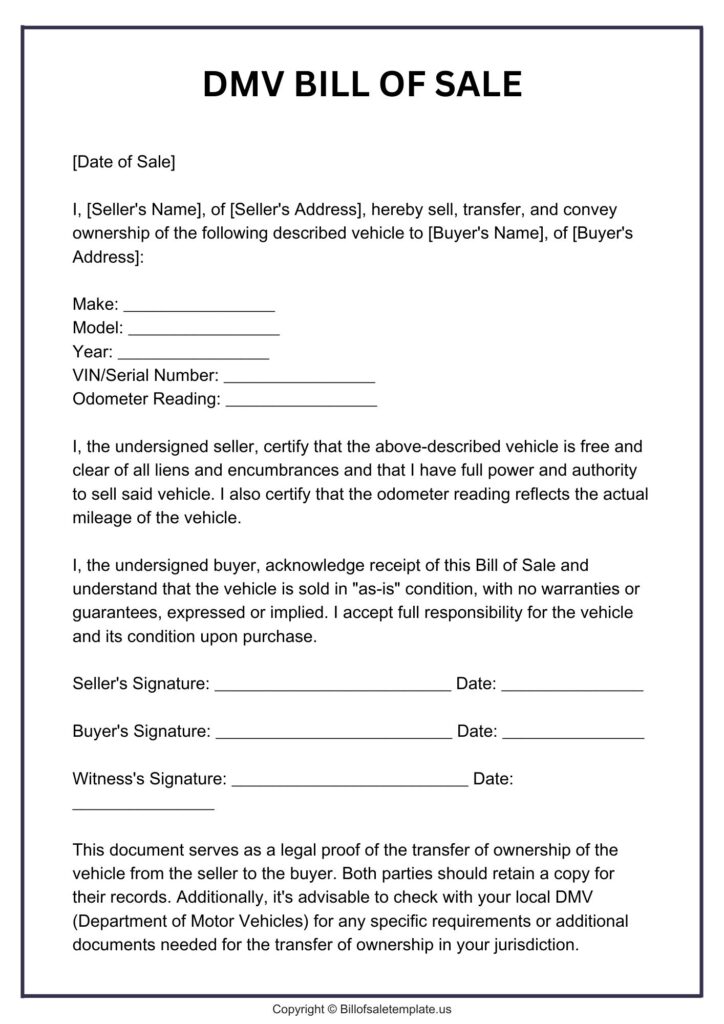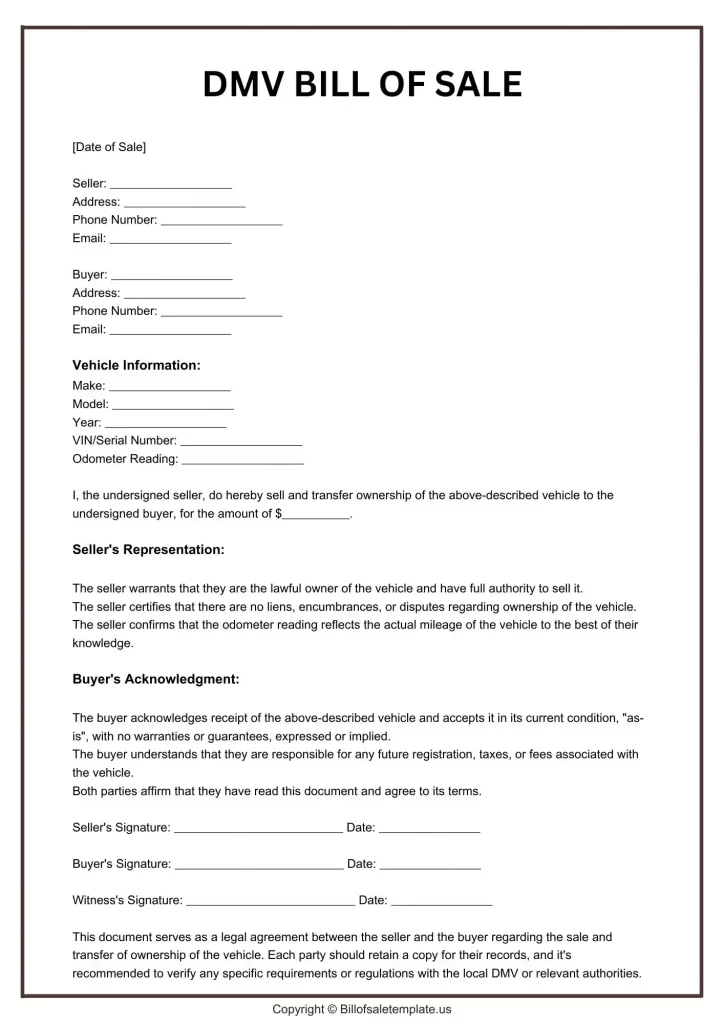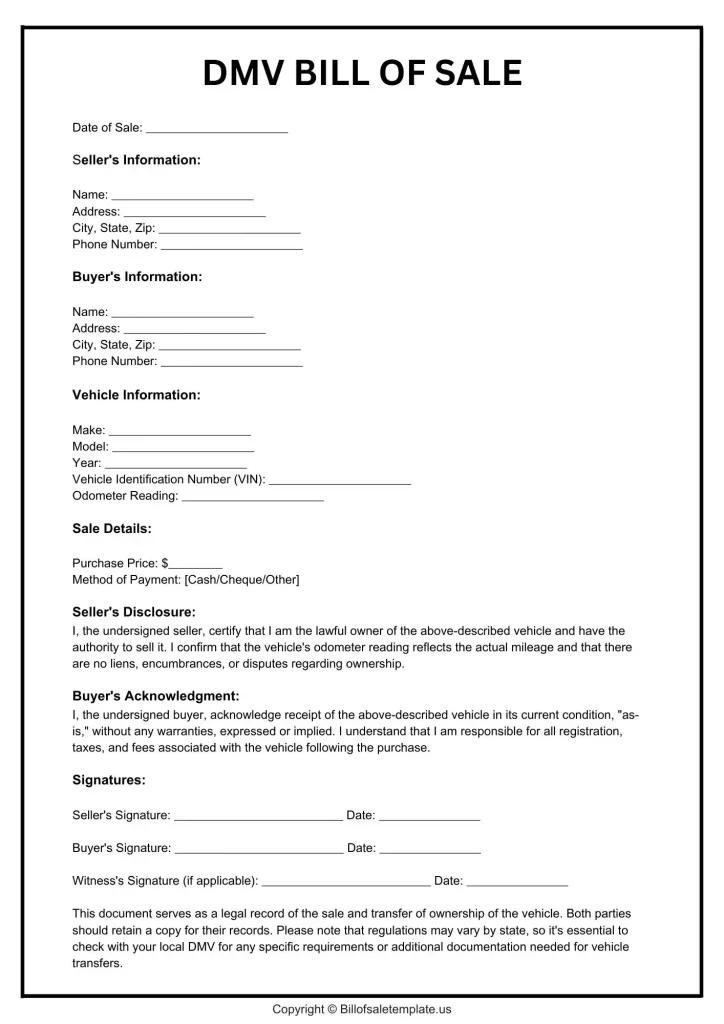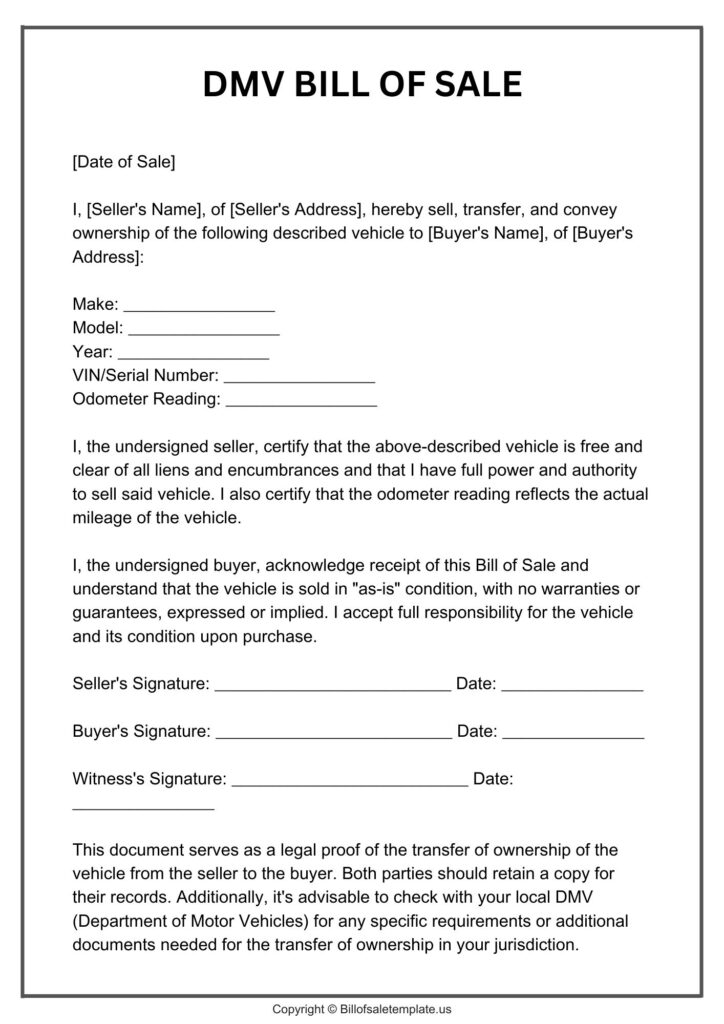A DMV Bill of Sale is a legal document used to record the sale and transfer of ownership of a motor vehicle from one party to another. This document typically includes crucial information such as the names and addresses of the buyer and seller, a detailed description of the vehicle (including make, model, year, VIN, and odometer reading), the sale price, and the date of the transaction.
Free Printable DMV Bill of Sale Form Template
It serves as proof of the transaction and is often required for the buyer to register the vehicle with the Department of Motor Vehicles (DMV). The Bill of Sale may also include additional terms and conditions of the sale, as well as the signatures of both parties to validate the agreement. This document helps protect both the buyer and the seller by clearly outlining the terms of the sale and providing a record that can be referenced in case of any future disputes.
DMV Bill of Sale without Title
Vehicles that come under a DMV Bill of Sale include a wide range of motor vehicles that require registration and titling through the Department of Motor Vehicles (DMV). These typically include:
- Passenger Cars: Standard cars used for personal transportation.
- Trucks and SUVs: Both light-duty and heavy-duty trucks, including sport utility vehicles.
- Motorcycles and Scooters: Two-wheeled motor vehicles, whether for recreational or commuting purposes.
- RVs and Motorhomes: Recreational vehicles and motorhomes used for traveling and living purposes.
- Trailers: Various types of trailers, including utility trailers, travel trailers, and fifth wheels.
- Boats and Watercraft: Certain states require a Bill of Sale for boats, jet skis, and other watercraft.
- ATVs and Off-Road Vehicles: All-terrain vehicles and other off-road vehicles used for recreation or work purposes.
These vehicles typically need a Bill of Sale when they are sold from one private party to another, and the document is required to facilitate the transfer of ownership and registration with the DMV.
DMV Bill of Sale Paperwork
A DMV Bill of Sale is a versatile legal document that can be used in various situations and for several purposes, primarily revolving around the transfer of ownership of motor vehicles. Here are detailed explanations of where and why this document is utilized:
Situations Where a DMV Bill of Sale is Used:
- Private Vehicle Sales: When a vehicle is sold between private individuals, a DMV Bill of Sale is essential. It serves as a formal record of the transaction, documenting the change of ownership from the seller to the buyer.
- Vehicle Gifts: If a vehicle is given as a gift, a DMV Bill of Sale can help to document the transfer and may be required for tax purposes and registration.
- Inheritance: When a vehicle is transferred as part of an estate settlement, a Bill of Sale can be used to document the transfer from the estate to the heir.
- Business Transactions: When businesses buy or sell vehicles, including fleet vehicles, a Bill of Sale ensures that the transaction is officially recorded.
- Auction Sales: Vehicles purchased at auctions typically require a DMV Bill of Sale to transfer ownership from the auction house or the previous owner to the new owner.
- Donations: When a vehicle is donated to a charity, a DMV Bill of Sale can serve as proof of the donation for both the donor and the charity, and may be needed for tax deduction purposes.
Purposes of a DMV Bill of Sale:
- Proof of Ownership Transfer: The primary purpose of a DMV Bill of Sale is to provide a legal record that ownership of the vehicle has been transferred from the seller to the buyer. This is crucial for both parties to avoid future disputes over ownership.
- Registration and Titling: Most DMVs require a Bill of Sale to register and title a newly acquired vehicle. It provides the necessary information to update the DMV’s records and issue a new title in the buyer’s name.
- Legal Protection: For both the buyer and the seller, the Bill of Sale offers legal protection. It clearly states the terms of the sale, the condition of the vehicle at the time of sale, and any warranties or “as is” statements, helping to prevent future disagreements.
- Tax Purposes: The Bill of Sale can be used to calculate sales tax, which is often based on the sale price of the vehicle. It is also important for personal or business tax records, documenting the purchase or sale of the asset.
- Insurance: When obtaining insurance for the vehicle, the new owner may need to provide the Bill of Sale to prove ownership and the value of the vehicle.
- Loan Documentation: If the buyer is financing the purchase of the vehicle, the lender might require a Bill of Sale as part of the loan documentation to confirm the vehicle’s purchase details and its use as collateral.
Blank Bill of Sale Form For DMV
In conclusion, the DMV BOS is a critical document in the realm of vehicle transactions, ensuring that all legal and administrative aspects of the sale or transfer are properly handled and recorded. It protects the interests of both parties and facilitates compliance with state laws and regulations.

Ted Cruz is the founder and driving force behind BillofSaleTemplate.us, a comprehensive resource for free bill of sale templates tailored to meet a variety of needs. With a keen understanding of the importance of accurate and legally sound documentation, Ted has dedicated his expertise to providing accessible and user-friendly templates for all types of transactions, from vehicle sales to personal property exchanges.
Recognizing the diverse legal requirements across different states, Ted has meticulously crafted state-specific bill of sale templates to ensure compliance and ease of use for users nationwide. His commitment to simplifying the process of creating reliable and legally binding documents has made BillofSaleTemplate.us a trusted platform for individuals and businesses alike.
![Free Bill of Sale Template PDF, Word [United States]](https://billofsaletemplate.us/wordpress/wp-content/uploads/2024/06/bill-of-sale-Logo-1-189x74.png)



